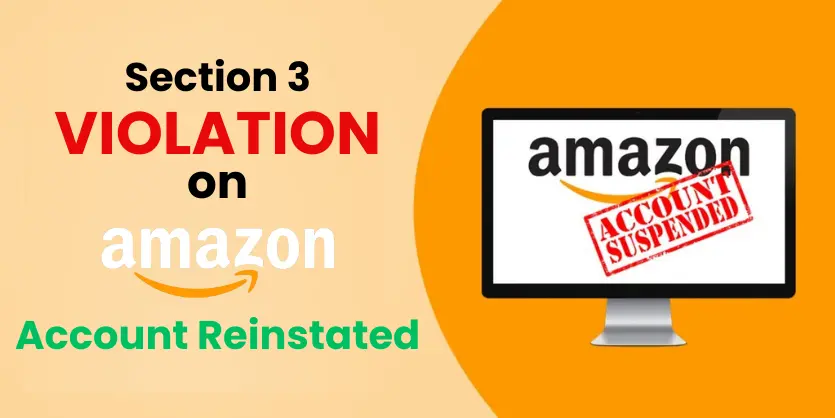Not knowing about Section 3 when selling on Amazon is like walking through a minefield blindfolded – you never know when disaster might strike. A Section 3 violation can put your Amazon seller account in great danger. In this post, we will cover what Section 3 is on Amazon, why it is so scary for sellers, what steps should be taken to prevent it, and how to handle the situation if your account is already suspended under Section 3. Additionally, we will discuss how to reactivate your account. Let’s get started.
What is Amazon’s Section 3 Violation?
A Section 3 violation refers to breaking Amazon’s rules and policies. If a seller breaches these policies, Amazon has the authority to terminate the account without notice or restrict access to certain Amazon features like Prime. Common violations include selling fake or illegal products. These violations severely damage a seller’s trust on the Amazon platform and can result in a Section 3 suspension.
Common Causes of Section 3 Violations
There are several activities that can lead to a Section 3 violation. In this blog, we discuss some of the most common causes that can lead to account suspension.
Selling Fake or Illegal Products
For instance, selling counterfeit iPhones at very low prices is a clear violation. Amazon prohibits selling guns, alcohol, tobacco-related products, fat burners, and other restricted items. A comprehensive list of restricted products is available on Amazon’s website.
Manipulating Reviews
Amazon takes review manipulation very seriously. This includes asking friends or family to leave positive reviews or using third-party services to buy reviews. Such practices are easily detected by Amazon and can lead to severe consequences.
Poor Customer Service
Consistently failing to meet Amazon’s performance metrics, receiving negative feedback, or having too many order cancellations can lead to a Section 3 violation. Maintaining high standards of customer service is essential.
Selling Low-Quality Products
Selling damaged, expired, or falsely advertised products can also result in a Section 3 suspension. Ensure all products meet Amazon’s quality standards.
Fair Pricing Policy
Overpricing products compared to other sellers or platforms is against Amazon’s fair pricing policy. For example, selling a handcrafted mug at an irrational price like $50 can result in restrictions. Prices must be equal to or lower than those on other marketplaces.
Preventing Section 3 Violations
Prevention is always better than cure. Here are some tips to avoid Section 3 violations:
Read and Understand Amazon’s Policies
Familiarize yourself with Amazon’s rules, especially Section 3, which covers what you can sell, how to act as a seller, protecting intellectual property, and serving customers well.
Maintain Product Compliance
Ensure your products meet all legal requirements and standards, including safety, labeling, and authenticity. Provide clear and accurate product information.
Follow Seller Guidelines
Adhere to Amazon’s rules for sellers, including fair pricing, accurate descriptions, and prompt order shipping. Avoid manipulating reviews or selling prohibited items.
Monitor Account Health Metrics
Regularly check your account health metrics such as performance and customer feedback. Address any issues promptly to avoid policy violations.
Respond to Customer Inquiries and Feedback
Provide excellent customer service and address any concerns professionally to ensure customer satisfaction.
Stay Informed and Updated
Keep up with Amazon’s policy changes by subscribing to their newsletters and announcements. You can also follow our YouTube channel for the latest updates on Amazon rules and regulations.
Seek Professional Advice if Needed
Consult with legal experts or e-commerce consultants if you need help understanding Amazon’s policies or handling specific issues.
Handling Account Suspension
If your account gets suspended despite all precautions, here’s what you should do:
- Identify the Reason: Amazon usually sends a notice explaining the reason for suspension and includes a plan of action.
- Create a Plan of Action: Address the issue by including steps to prevent further policy violations. For instance, upgrade your product listings and review your inventory.
- Write an Appeal Letter: Your appeal letter should be professional and detailed, addressing all issues raised in the suspension notice. Provide evidence such as invoices or receipts to support your case. Explain the steps taken to address the issues and ensure future compliance.
- Be Sincere and Respectful: Take responsibility for the issues and show commitment to doing better in the future. Avoid blaming others for your suspension.
Conclusion
To make a profit or achieve better sales on Amazon, do not violate policies. It will harm your reputation, trust, and a lot of other things. Stay updated with Amazon’s policies, and always remember that prevention is better than cure.
If you think this post has been helpful for you, please share this post with your friends and the e-commerce community. You can also check out our website www.ecomclips.com and get more updates! Keep browsing our blog to get more articles related to e-commerce. You can also mail us at info@ecomclips.com if you need any more help with Amazon.

